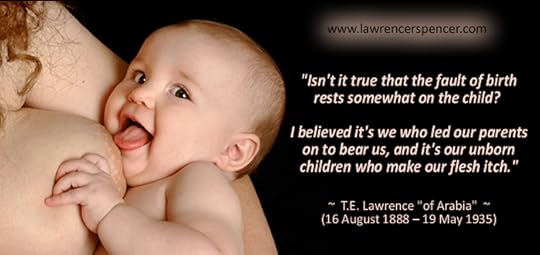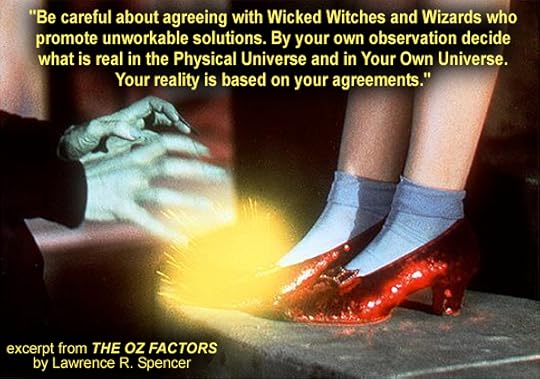Lawrence R. Spencer's Blog, page 220
October 7, 2020
SCIENTIFIC PROOF THAT TOO MUCH SMILING CAN CAUSE PERMANENT DISFIGURATION
Republished by Blog Post Promoter
“Science” is the religion of Materialists who worship “The Creation” called the physical universe, but does not acknowledge a “source” of all that has been created. All “good science” is supposedly based on an “observation, analysis and catagorization of the characteristics and behavior of physical universe phenomenon AND the creation of theories or hypotheses to explain the mechanical function of the phenomenon.
Therefore, anything which cannot be “observed” in the physical universe is either 1) doesn’t exist or 2) is mysticism, superstition, witchcraft, blah, blah, blah, blah, blah…..
Based on my definition of “science” above, I’ve discovered a new “scientific theory” which PROVES my new theory. I call it “The Theory of Permanent Disfiguration by Excessive Smiling“.
(AS YOU READ THIS POST, I AM PREPARING MY ACCEPTANCE SPEECH FOR THE NOBEL PRIZE COMMITTEE.)
Here is undeniable, empirical, photographic PROOF of my Theory:
SAMPLE 1: PROOF OF DISFIGURATION FROM EXCESSIVE SMILING
SAMPLE 2: PROOF OF DISFIGURATION FROM EXCESSIVE SMILING
I THINK THEREFORE I HAVE A TOOTHACHE
Republished by Blog Post Promoter
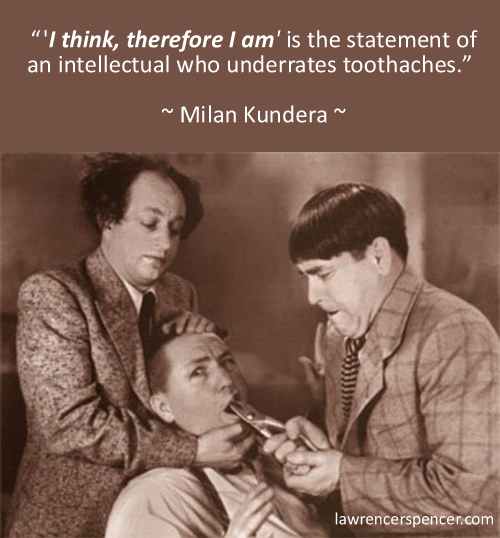 Milan Kundera (born 1 April 1929) is a Czech-born writer who went into exile in France in 1975, and became a naturalized French citizen in 1981.
Milan Kundera (born 1 April 1929) is a Czech-born writer who went into exile in France in 1975, and became a naturalized French citizen in 1981.
Kundera’s most famous work, The Unbearable Lightness of Being, was published in 1984. The book chronicles the fragile nature of an individual’s fate, theorizing that a single lifetime is insignificant in the scope of Nietzsche’s concept of eternal return. In an infinite universe, everything is guaranteed to recur infinitely. In 1988, American director Philip Kaufman released a film adaptation.
Prior to the Velvet Revolution of 1989 the Communist régime in Czechoslovakia banned his books. He lives virtually incognito and rarely speaks to the media. A perennial contender for the Nobel Prize in Literature, he has been nominated on several occasions
October 6, 2020
OTHERS
Republished by Blog Post Promoter
John Holmes (January 6, 1904 – June 22, 1962), was a poet and critic.He was born in Somerville, Massachusetts, and both attended and taught at Tufts University where he was a professor of literature and modern poetry for 28 years. He wrote several volumes of poetry and the lyrics to several Unitarian Universalist hymns, including “The People’s Peace”.
October 5, 2020
SHERLOCK HOLMES – MY LIFE, Chapter Four
Republished by Blog Post Promoter
[image error]
CLICK THE LULU BUTTON TO READ THE ENTIRE BOOK:
CHAPTER FOUR: A CHARMING CHESHIRE CHEESE
“Would you tell me, please, which way I ought to go from here?”, asked Mr. Dodgson.
“That depends a good deal on where you want to get to”, I replied.
“I don’t much care where…”, said Mr. Dodgson.
‘Then it doesn’t matter which way you go”, said Watson.
“I have solved many obscure and nefarious cases in my career to date. However, the singular complexity of the matter which stands before us now — these accusations and alternative explanations, present features of a most illogical and inexplicable nature”, I said, passing the butter dish across to Mr. Dodgson.
“Prey, do have some butter with your bread “, I suggested, “while I ring for our landlady, Mrs. Hudson, to bring up the main course of our meal”, I said, stepping across to pull upon the bell chord to alert our mistress that we were ready to be served.
Momentarily, Mrs. Hudson appeared at the door, huffing with exertion of having carried a large tray of dishes up the stairs. She set the tray upon the sideboard.
“Will there be anything else you require, gentlemen?”, she asked. “If not, then I will retire for the evening. I’ve had a long day of shopping and preparations and cooking and cleaning already. Just leave the dishes outside the door when you have finished, and I will fetch them in the morning”, she said bowing herself out the door.
“Please leave to door open, Mrs. Hudson, if you would be so kind”, I said as she started to close it behind her.
“That will not be necessary, Mr. Holmes”, said Dodgson. “I feel quite reassured that I am safe with you”.
“Very well then. Good evening to you all then, gentlemen”, she said. She glanced back at me curiously and pushed the door closed, turned and trudged back down the stairs.
The meal was hearty, yet bland, as is the traditional fair for the citizens of London: boiled flesh of some unidentifiable creature, peeled and boiled potatoes with a few carrots, bread, butter, and a pot of tea. Fortunately, I had taken the trouble to supply ourselves with two bottles of red table wine for the occasion, which enlivened the otherwise nondescript flavor of the food.
As we finished eating our meal, and placing the dishes outside the door, as instructed by Mrs. Hudson, I reviewed the peculiar features of our situation with my companions.
“For the sake of securing the status of my identity, and to respond the most singular accusations brought against us by Dr. Doyle, please let me summarize the possible resolutions to this anomaly. Several possible answers may be postulated, as follow:
1. That I am impersonating a fictional character created by Dr. Doyle in his works of fiction, notwithstanding the testimony of Constable Barrett, who one might argue, is himself a fictional character. That being the case, all here present must also be fictional characters, including Dr. Dodgson.
2. That I am a real person, from whom Dr. Doyle, as the author of works of fiction, has copied my name, address, actions and characteristics as a source of inspiration for his stories.
3. That I am a real person, and that the author is an imposter, or a fictional character. Inasmuch as you visited the alleged gentleman yourself upon this very morning, one would assume that he, like ourselves, is not a fictional character.
4. That Dr. Watson and I are both fictional characters, including all of our surroundings, environs, apartment, possessions, bodies, memories, expertise and identities: a hypothesis which seems to have been disproven thus far, unless further evidence presents itself to our attention.
5. That Mr. Dodgson and Dr. Doyle are real characters, including all of their surroundings, environs, apartments, possessions, bodies, memories, expertise and identities, and Dr. Watson and I are both impersonating fictional characters, as discussed.
6. An alternative solution may also be proffered: that each and all of what is supposed to be “real”, whether deemed fact or fiction by the observer, are equally illusions. Therefore, neither comprises a definition of reality or fantasy, accept by the subjective opinion of the observers, creators and / or characters”, I concluded.
I paused momentarily to fill my pipe, and allowed sufficient time for the gravity and details of my proposition to be absorbed by Dr. Watson and our guest. Neither of them had anything further to offer in the argument at the moment. No doubt they were confounded by the apparent absurdity of my arguments. Nonetheless, taking silence as permission to continue, I resumed my deductive analysis.
“I have observed that the lowest and vilest alleys in London do not present a more dreadful record of sin than does the smiling and beautiful countryside”, gentlemen.
“I do not see what you are getting at, Holmes”, said Watson. Mr. Dodgson looked up with equal, but silent, agreement.
“On the contrary, Watson, you can see everything. You fail, however, to reason from what you see. You are too timid in drawing your inferences”, I said, taking a seat in my armchair, and inviting our guest to take a cigar from the box I offered.
“However, before we digress, let me allude to the discussion that Mr. Dodgson and I had when I visited him in is quarters. He himself mentioned several methods of investigation which he has studied in the alchemical works of Sir Isaac Newton, and in his own mathematical application of portmanteau poetry to the development of mathematical thinking.
“Circumstantial evidence is a very tricky thing. It may seem to point very straight to one thing, but if you shift your own point of view a little, you may find it pointing in an equally uncompromising manner to something entirely different”, I said while crossing over to the sideboard.
I picked up the manuscript that Mr. Dodgson had given me when I visited him entitled, Alice’s Golden Hour. While flipping through the pages to find a particular passage, I asked Mr. Dodgson a question about his work.
“Might I inquire as to the origin of one of the fictional characters whom Alice meets in Wonderland — The Cheshire Cat?”
“Frankly, I believe the idea came to me from an old expression I learned as a child”, replied Mr. Dodgson after momentarily pondering the question. “I believe it to be derived from a cheese which was sold in Cheshire, near my home. The cheese was molded in the shape of a cat. The cheese was cut from the tail end first, so that the last part eaten was the head of the smiling cat”.
“Very well”, I said. “Let us then observe that you have extracted something from the reality of your childhood, and with a liberal application of your creative imagination have used it to conjure an illusion…an alternative to reality, as it were. Is this not so, Mr. Dodgson?”
“Well, yes, I suppose. However, I fail to see what relevance my fictional tales have to our current situation. Certainly you do not suppose that I am to believe that reality can be conjured from a work of fiction? The notion is absurd!”, he replied.
“I do not ask you, or anyone, to believe anything whatsoever. Belief is a matter of personal opinion or conviction which cannot be shared by anyone else, accept to the degree that they share a similar opinion. Some men believe that the world was created by an omnipotent, invisible being in seven days. People in some aboriginal tribes believe that the world is supported on the back of an enormous elephant which stands upon the shell of a colossal tortoise”, I said, finally arriving at the pages I was looking for in the manuscript.
“As for myself, I believe that what is true for you is true for you, although no other person may agree upon your belief. Regardless, a truth for you, may not be true for others. Is that not a fundamentally sound assumption?”, I asked.
“I suppose you are right Mr. Holmes. It is difficult, if not impossible, to stay apace of your ability to remain logical in the face of a situation which is so absurdly enigmatic. You are proposing that the philosophical paradigm of reality should be considered of equal importance with fiction. How can you ever solve a criminal case, your occupation, if every piece of hard evidence could be a contrivance of imagination on the part of the investigator or of the criminal?”, said Mr. Dodgson.
“Quite the contrary”, I said. “But rather than keeping to my methods alone, let me ask you what meaning you attribute to the following passage in your book”, I said, turning to the page which described in the encounter between Alice and the Cheshire Cat.
“Let me read your own words to you.”
“…she was a little startled by seeing the Cheshire Cat sitting on a bough of a tree a few yards off.
The Cat only grinned when it saw Alice. It looked good-natured, she
thought: still it had VERY long claws and a great many teeth, so she
felt that it ought to be treated with respect.
‘Cheshire Puss,’ she began, rather timidly, as she did not at all know
whether it would like the name: however, it only grinned a little wider.
‘Come, it’s pleased so far,’ thought Alice, and she went on. ‘Would you
tell me, please, which way I ought to go from here?’
‘That depends a good deal on where you want to get to,’ said the Cat.
‘I don’t much care where–‘ said Alice.
‘Then it doesn’t matter which way you go,’ said the Cat.
‘–so long as I get SOMEWHERE,’ Alice added as an explanation.
‘Oh, you’re sure to do that,’ said the Cat, ‘if you only walk long
enough.’
Alice felt that this could not be denied, so she tried another question.
‘What sort of people live about here?’
‘In THAT direction,’ the Cat said, waving its right paw round, ‘lives
a Hatter: and in THAT direction,’ waving the other paw, ‘lives a March
Hare. Visit either you like: they’re both mad.’
‘But I don’t want to go among mad people,’ Alice remarked.
‘Oh, you can’t help that,’ said the Cat: ‘we’re all mad here. I’m mad.
You’re mad.’
‘How do you know I’m mad?’ said Alice.
‘You must be,’ said the Cat, ‘or you wouldn’t have come here.’
Alice didn’t think that proved it at all; however, she went on, ‘And how
do you know that you’re mad?'”
“So, Mr. Dodgson, let me pose the same question to you that young Alice asked of the chimerical cat in your own story: how do you know whether you are mad or not mad? How would you satisfy yourself that I am not mad? How do we know that everyone is mad or not mad?”, I said, rising from my chair to place the manuscript upon the sideboard.
I refilled my pipe once again, in anticipation of the protracted debate that was sure to follow on the heels of these profoundly absurd, yet existential queries and arguments.
Mr. Dodgson did not seem the least bit nonplused by my insinuation regarding his sanity, or the sanity of all. Rather, he thanked us very cordially for our hospitality, rose from his chair and reached the door to exit the apartment. As he reached the door he turned back to me.
“Mr. Holmes, I will leave the resolution of this mystery entirely in your very capable hands. If anyone were able to solve the questions you pose to me, I assure you that I am not that man. Neither are any of the mentors whom I have studied, including Sir Isaac himself. I trust that you will be kind enough to inform me of your eventual success, if such is possible. Good day to you, gentlemen”.
With that, he departed, clomped down the stairs. Through the window we saw him walk briskly away through a light drizzle of rain in the direction of the train station.
“What do you make of it Holmes?”, asked Watson, who seemed to have been disquieted by our visitor. “I must admit that our meeting with this gentleman is the most perplexing I have ever had,” he said, resuming his seat in front of the fire.
“Yes. Most perplexing, indeed”, I agreed, taking my own seat and refilling my pipe. “Most perplexing.”
“What do you know of this Dr. Doyle?”, I asked Watson after an interlude of silent contemplation.
“Well, I can’t say that I know anything about the man”, he said. “Have you not heard anything of him?”
“No. I have not. However, our friend, Mr. Dodgson seems to know quite a good deal about the fellow. So much so, that he was entirely certain that it is I that perform the part of an imposter in an imaginary play invented by this man!”, I observed.
“Well, my dear fellow, in my professional opinion as a doctor, I am certain that this gentleman is suffering from the residual effects of some narcotic. His own fantastical story, from which you read to us this evening, seems very peculiar indeed!”, said Watson. “And, his behavior is quite inappropriate for a professor of mathematics at Oxford, certainly. Perhaps the allegations suggested in the newspaper, that the man is a pedophile, or a kidnapper, should be investigated more thoroughly”, he suggested.
“Perhaps”, I said. “Let us sleep upon the matter for the moment. In this instance, however, the best way of successfully acting a part is to be it”, I conjectured. ”
___________________________________
Copyright © 2011 by Lawrence R. Spencer. All Rights Reserved.
THE FAULT OF BIRTH
Republished by Blog Post Promoter
Thomas Edward Lawrence (16 August 1888 – 19 May 1935) was an archaeologist and British Army officer renowned especially for his liaison role during the Sinai and Palestine Campaign, and the Arab Revolt against Ottoman Turkish rule of 1916–18. The breadth and variety of his activities and associations, and his ability to describe them vividly in writing, earned him international fame as Lawrence of Arabia, a title which was later used for the 1962 film based on his First World War activities.
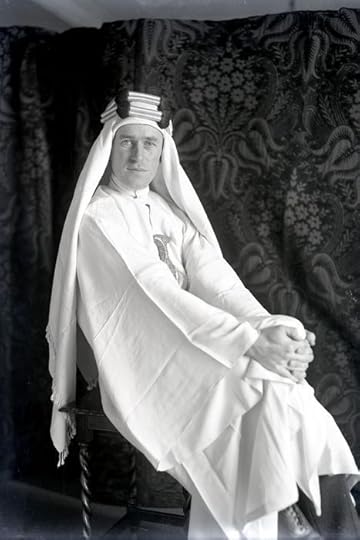 Lawrence was born out of wedlock in Tremadog, Wales, in August 1888 to Sir Thomas Chapman and Sarah Junner, a governess who was herself illegitimate. Chapman had left his wife and first family in Ireland to live with Junner, and they called themselves Mr and Mrs Lawrence. In the summer of 1896 the Lawrences moved to Oxford, where in 1907–10 young Lawrence studied History and graduated with First Class Honors.
Lawrence was born out of wedlock in Tremadog, Wales, in August 1888 to Sir Thomas Chapman and Sarah Junner, a governess who was herself illegitimate. Chapman had left his wife and first family in Ireland to live with Junner, and they called themselves Mr and Mrs Lawrence. In the summer of 1896 the Lawrences moved to Oxford, where in 1907–10 young Lawrence studied History and graduated with First Class Honors.
He became a practicing archaeologist in the Middle East, working at various excavations with David George Hogarth and Leonard Woolley. In 1908, he joined the Oxford University Officers’ Training Corps and underwent a two-year training course. In January 1914, before the outbreak of the Great War, Lawrence was commissioned by the British Army to undertake a military survey of the Negev Desert while doing archaeological research.
Lawrence’s public image resulted in part from the sensationalized reportage of the Arab revolt by an American journalist, Lowell Thomas, as well as from Lawrence’s autobiographical account Seven Pillars of Wisdom (1922). In 1935, Lawrence was fatally injured in a motorcycle accident. Lawrence was portrayed by Peter O’Toole in the 1962 film Lawrence of Arabia.
READ MORE ABOUT THE LIFE OF T.E. LAWRENCER (A.K.A. “Lawrence of Arabia”)
October 4, 2020
I BELIEVE
Republished by Blog Post Promoter
I BELIEVE IN THE “ONLY” GOD
I BELIEVE “IT CAN’T HAPPEN HERE”
I BELIEVE THAT TV “NEWS” IS REAL
I BELIEVE THAT MY VOTE “COUNTS”
I BELIEVE THAT “MY” GOVERNMENT IS GOOD
I BELIEVE THAT I MUST “BELIEVE” IN “HOPE” AND “LOVE”
I BELIEVE THAT FEDERAL RESERVE NOTES ARE “REAL” MONEY
I BELIEVE THAT “GOOD” ALWAYS CONQUERS THE “FORCES OF EVIL”
I BELIEVE THAT WHEN I DIE I WILL GO THE HEAVEN IF I AM “GOOD”
I BELIEVE THAT “GOD” WILL DECIDE I AM “GOOD” BECAUSE I BELIEVE IN LIES
PORN
Republished by Blog Post Promoter
 One report published in the first quarter of 2010, asserts that 37 percent of all the content hosted on the Internet was of a pornographic nature. That number comes from Optenet, a global IT security company. After porn, the next four content types are shopping (9 percent), travel (5.7), computing (4.2) and sports (4.2). The study looked at 4 million URLs. Among the interesting things it discovered was that porn appears to be on the rise. Between 2009 and 2010, pornographic sites increased by 17 percent. The study also offers other interesting conclusions on other types of growing content. Sites about online games (like World of Warcraft or Final Fantasy XI) have grown 212 percent!
One report published in the first quarter of 2010, asserts that 37 percent of all the content hosted on the Internet was of a pornographic nature. That number comes from Optenet, a global IT security company. After porn, the next four content types are shopping (9 percent), travel (5.7), computing (4.2) and sports (4.2). The study looked at 4 million URLs. Among the interesting things it discovered was that porn appears to be on the rise. Between 2009 and 2010, pornographic sites increased by 17 percent. The study also offers other interesting conclusions on other types of growing content. Sites about online games (like World of Warcraft or Final Fantasy XI) have grown 212 percent!
However, the Internet may not be as pornography-filled as you might think. In fact, according to one expert, only 42,337 of the one million most-trafficked websites online are offering sex-related content, which translates into somewhere around 4% of sites on the Internet. That surprising figure—am I the only person who expected it to be much higher?—comes from neuroscientist Ogi Ogas who collected porn statistics as research for his book A Billion Wicked Thoughts. He went on to say that 13% of all web searches between July 2009 and July 2010 were for “erotic content,” down from an estimated 40-50% ten years earlier.
Porn’s big business, by anyone’s measure. According to TechCrunch, in 2006, U.S. porn sites generated $2.84 billion in revenue (thank you, mostly men—72% were then listed as porn viewers). More recent statistics put the number of pornographic websites at 4.2 million (about 12% of total, a substantial slice), Internet porn sales at nearly $5 billion, peg porn-related materials to a full 25% of daily search engine requests, claim 42.7% of Internet users view porn, and note that it’s not just guys crawling the web’s steamier side these days—one in three visitors to adult websites is female. The majority of viewers of online pornography are men; women tend to prefer romance novels and erotic fan fiction. Women comprise about one quarter to one third of visitors to popular pornography websites, but are only 2% of subscribers to pay sites. Subscribers with female names are flagged as signs of potential credit card fraud, because “so many of these charges result in an angry wife or mother demanding a refund for the misuse of her card.
Of course, pornography has an advantage when it comes to total Internet volume: porn sites usually consist of bandwidth-hogging videos. If not for this, we believe the Web would be dominated by photos of cats.
Here is a link to a “FREE PORN” website that females will be happy for their man to visit:
AGREEMENT
Republished by Blog Post Promoter
“DOESN’T ANYBODY BELIEVE ME?
“Doesn’t anybody believe me?“–Dorothy
“Of course we believe you, Dorothy…“–Uncle Henry in ‘The Wizard of Oz’
Is reality really real?
As Dorothy discovered when she returned back to Kansas, her friends and family did not agree that the Land of Oz was “reality”.
Conversely, gaining agreement from one’s friends does not guarantee that the information agreed upon is true or workable or survival. Agreement is not necessarily reality. Although Man seems to crave agreement with his fellows, the fact that “everyone agrees that the world is flat” or that “the sun revolves around the Earth”, does not make it a reality.
History has shown that agreements among people have very frequently proven to be disastrous.
Example: Adolph Hitler gained the complete, unabated agreement of the majority of the German population before he led them into total self-destruction.
Lots of people agree when fast food franchise advertisements tell them that cheeseburgers, fries and milk shakes are good for them. We were, and still are, told, based on “medical research” that these foods contain nutrients from all the “four basic food groups”. This doesn’t change the fact that you get fat, develop hardened arteries and die an early death from heart disease or cancer if you keep eating cheeseburgers, fries and shakes.
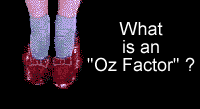 The unprecedented multi-billion dollar profit margins earned by the beef and dairy industry and sugar growers in cooperation with the fast food restaurant cartels have a heavy influence on “truth in advertising”. In addition, the quality of information we receive, as consumers, from the American Medical Association regarding “the science of nutrition” is directly influenced by fast food commercial interests.
The unprecedented multi-billion dollar profit margins earned by the beef and dairy industry and sugar growers in cooperation with the fast food restaurant cartels have a heavy influence on “truth in advertising”. In addition, the quality of information we receive, as consumers, from the American Medical Association regarding “the science of nutrition” is directly influenced by fast food commercial interests.
Only one generation ago the Japanese people were nearly free of heart disease and cancer. In just 20 short years, since they have openly adopted the Standard American Diet (SAD)–cheeseburgers/French fries/milk shakes and liquid caffeine-filled sugar water called cola–the incidence of heart disease and cancer among the Japanese people has skyrocketed. The Japanese agreement with Western lifestyles is killing them.
Reality is often heavily influenced by the Oz Factor of agreement. Agreements influence our perception of reality. A child’s perception of his environment, his religious and political ideas and viewpoints about people are often heavily influenced by agreement with his mother and father.
Be cautious with whom you agree. Carefully examine ideas and information before you agree. Just because the preacher says, “sex is evil” or the President says, “I’m not a crook”, does not make it reality.
Be careful about agreeing with Wicked Witches and Wizards who promote unworkable solutions. By your own observation decide what is real in the Physical Universe and in Your Own Universe. Your reality is based on your agreements.”



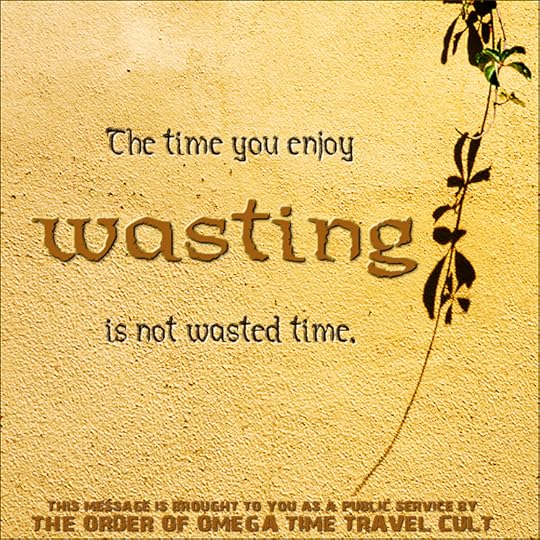
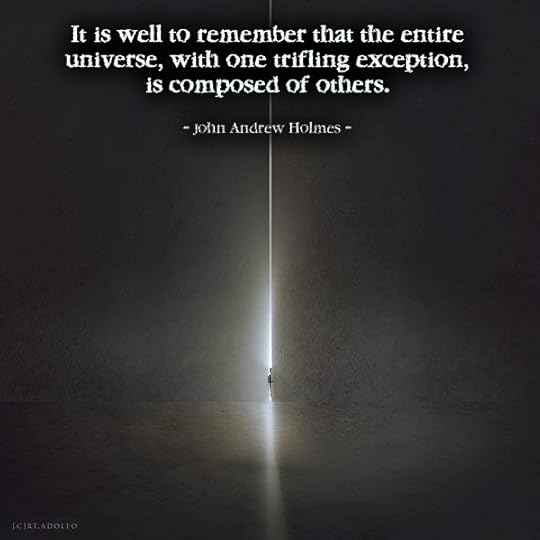
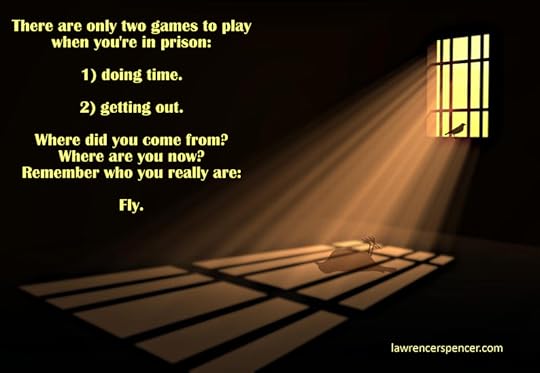 There are only two games to play when you’re in prison: 1) doing time 2) getting out. Where did you come from? Where are you now? Remember who you really are: Fly.
There are only two games to play when you’re in prison: 1) doing time 2) getting out. Where did you come from? Where are you now? Remember who you really are: Fly.
